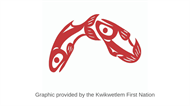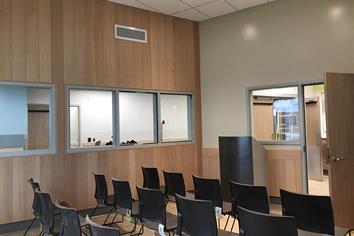The new provincial facility, operated by BC Mental Health and Substance Use Services, which is part of the Provincial Health Services Authority, is for British Columbians with concurrent disorders—that is, with both mental health and substance use issues—and located on what used to be called the Riverview Lands. Today, the area is called
səmiq̓ʷəʔelə, which means "Place of the Great Blue Heron" in hən̓q̓əmin̓əm̓. The Province of B.C. renamed Riverview to "səmiq̓ʷəʔelə" as an act of reconciliation and to honour the Nation’s ties to our ancestral lands.

“We have used the lands for hunting, gathering, and getting away from the floods,” says George Chaffee, a Kwikwetlem Councillor and knowledge keeper. “And anytime we want to heal somebody, we’ll take them to the forest or up to the mountains, because that’s our place of power. So, when PHSA leaders first came in, the idea from the elders was that yes, this is a place of power. This would be excellent for our brothers and sisters who need help and who need healing. That’s the reason the Nation opened up our hands to this.”
When naming the facility in 2019, BC Mental Health and Substance Use Services wanted to honour the history of the site, and asked the Kwikwetlem First Nation for suggestions. They suggested θəqiʔ ɫəwʔənəq leləm, which is hən̓q̓əmin̓əm̓ for the Red Fish Healing Centre.
"Calling it Red Fish means that the Kwikwetlem people are still here, and the name itself stands for healing."
The name kʷikʷəƛ̓əm in English means “Red Fish Up the River” which describes a unique run of sockeye salmon that once ran plentiful in the Coquitlam River.
“The name means everything to us,” Councillor Chaffee says. “It is who Kwikwetlem people are. For us, it’s an honour to name it. Calling it Red Fish means that the Kwikwetlem people are still here, and the name itself stands for healing. It is the perfect name to put to the centre.”
For Chief Ed Hall, the name “Red Fish” also speaks to a powerful journey—perhaps not unlike the journey that clients who come to Red Fish will undertake.
"Salmon is a resource that we really take pride in being able to have, and hopefully, for generations to come, the salmon will survive, and thrive,” he said. “They are a very, very hardy species of being. From where they're born, they go to the oceans, and then they come back and they have to dodge the fishing nets, the hooks and the bears and everything else that goes after them.”
“The name is only the most visible aspect of our partnership with the Kwikwetlem First Nation,” said Lynn Pelletier, the VP of BC Mental Health and Substance Use Services. “We could not be opening a facility like Red Fish on this site without their collaboration. They have been stewarding their sacred and ancestral grounds for thousands of years, and it is our honour and privilege to be learning and working alongside them to turn səmiq̓ʷəʔelə into a place of healing again.”
BC Mental Health and Substance Use Services team members, including Lynn Pelletier, vice president (right), and Kathryn Embacher, senior director of patient care services (middle), joined the Kwikwetlem First Nation and a carver from the Kwantlen First Nation during the creation and carving of the Kwikwetlem house post.
They have collaborated on landscaping and healing gardens, including the placement of river rocks in the client atrium, as well as on programming that will help ensure clients can benefit from the land’s healing properties.
We also consulted with them on
Red Fish’s care model, which is trauma-informed and holistic, and focuses on each client and patient as an individual with their own history. This aligns with the Indigenous sacred teachings of truth, honesty, humility, courage, respect, love and wisdom.

The Kwikwetlem First Nation also played an essential role in the creation of the Hummingbird Room, a cedar-lined space designed for spiritual healing practices such as smudging. A local artist is currently at work on a mural in the room that helps tell the story of the Kwikwetlem lands.
Chief Ed Hall says he was skeptical when he first heard of the plans by the Provincial Health Services Authority and the provincial government to establish a new facility on the grounds once occupied by Riverview Hospital. But with the centre nearing opening day, he is excited that his Nation’s work is about to pay off with the state-of-the-art, innovative treatment facility. Red Fish, he believes, will help the people who need it most.
“The focus of treatment is a holistic approach, and I can’t say enough about that,” Chief Hall says. “Red Fish is going to be extraordinary and unique.”
